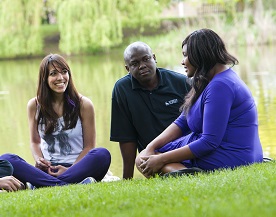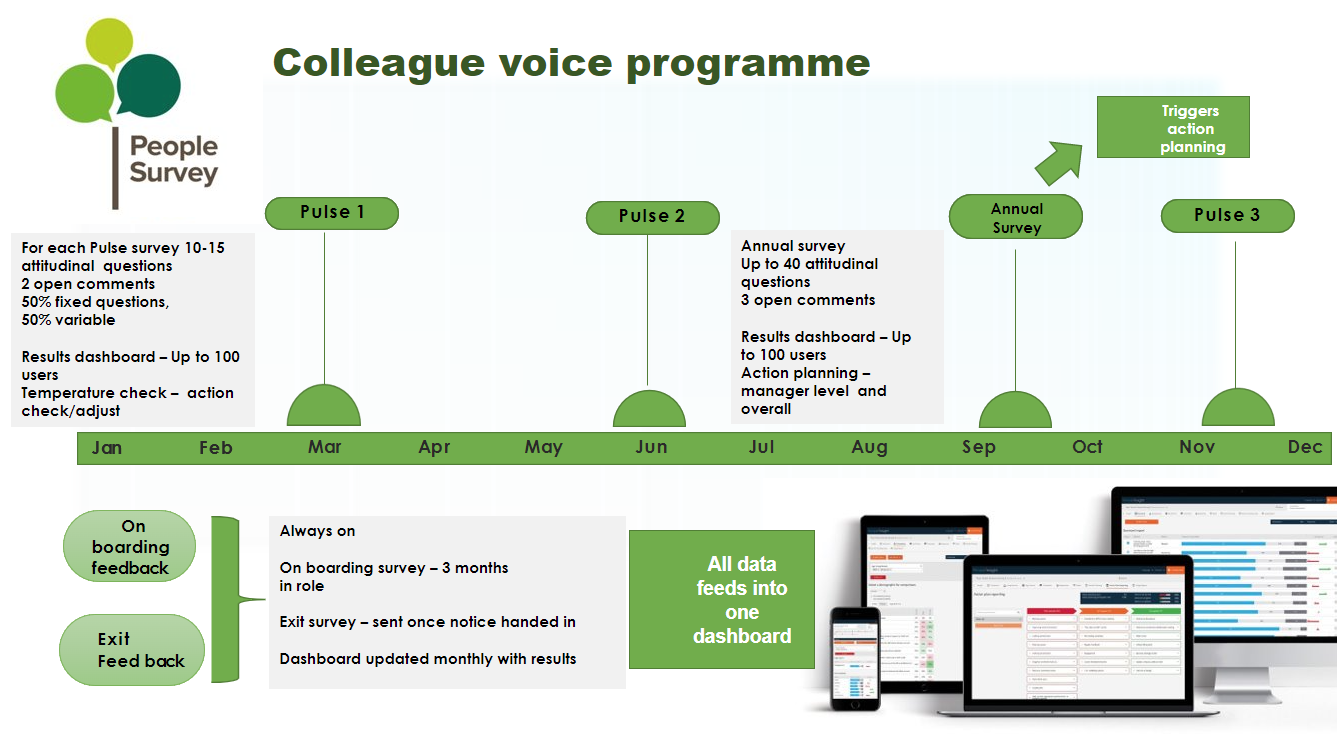Innovative ideas: How Lisa engaged and energised colleagues in the survey programme
1.You said, we did’ reminds employees of the benefits of feedback and actions taken previously
At the start of Lisa’s journey, it was vital that colleagues could see and feel a fresh approach to the survey programme. Lisa began the survey cycle with a ‘You said, we did’ internal communications campaign to remind everyone of the emphasis going forward – action and change because of listening to employee feedback.
The use of an infographic in traditional university colours closed off the previous survey actions, while in the background we were working on a new look and feel and starting to get our colleague audience ready for what was to come.
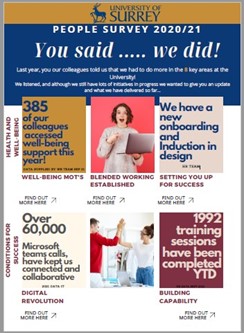
2. Tree planting as an incentive for survey participation
One of the objectives of the survey programme was to have more impact, so Lisa broadened this out to align with the university’s sustainability goals.

To encourage participation, each time a participant completes the survey, the University commits to planting a tree. This incentive is tied into the survey branding. It is achieved in partnership with the Eden Reforestation Project, which enables tree planting work for impoverished communities around the world. As the university community started to come back together after lockdowns, it was felt that this was a great initiative to be involved in.
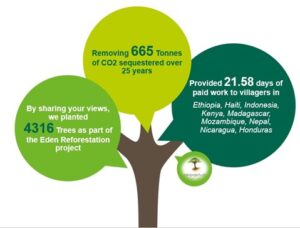
3. Pre-survey workshops for managers with a focus on action
A critical step in the change of approach was a series of line manager workshops before the survey launched. The workshops shared the vision for colleague voice as a vehicle for positive change, shared the survey programme in detail and encouraged ownership of results and action.
Over 500 managers were invited to participate. The sessions were co-run by Lisa and People Insight, and the agenda included:
- The vision for more dynamic employee listening at the university
- How the survey questionnaires were designed (of particular interest to academic staff who are themselves experts at sophisticated research techniques)
- The benefits of the colleague voice for line managers – for example building relationships with team members, improving team performance, and bringing people together with common goals
- Live demos showing how the People Insight dashboard made it easy for managers to review results, create instant presentations, dig deeper into the data, and create online action plans
- What was expected of line managers before, during and after the surveys
- How results would be communicated
- How action planning would work at the university and team level; with pan-university and faculty level focus groups planned to act forwards.
It wasn’t just the content of the workshops that was important, the delivery of the workshops and the communication around them was critical. There was a great deal of transparency and honesty about the whole approach, delivered with energy and positivity throughout.
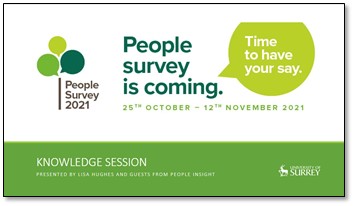
4. Ambassadors for hard-to-reach populations support inclusion
The survey programme is 100% digital, but not every team around the university has daily access to IT. To ensure these teams can make their voices heard, QR codes and kiosks are made available, with support from ‘Ambassadors’ who work tirelessly to encourage participation, with snacks on offer for good measure.
5. How Lisa got almost 100 managers engaging with the survey results dashboard
Having whet the appetite for the survey results by sharing demos of the results dashboard in the pre-survey workshops, Lisa had created interest for managers in getting their hands on their own results.
Instead of just cascading the dashboard access via email (which is an approach we frequently see), Lisa invited managers to request access. Those who took this up early, or who had really engaged with the workshops told others. Soon Lisa had almost 100 managers accessing the results, creating presentations, and running sessions with their teams. The fact that Lisa nudged colleagues towards the results, rather than issued mandatory guidance, has been successful for the university.
6. Manager capability building for survey action planning and change
Once the survey was complete, Lisa followed up the line manager workshops with guides, training videos and templates (from the People Insight Content Hub). Lisa also held coaching sessions to maintain the momentum for results analysis and action planning. The toolkits served to build managers’ knowledge and capability in their role in supporting the survey results with their teams.
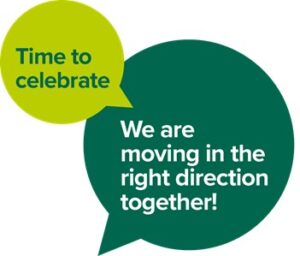
7. Pan–university focus groups and opening up the use of the dashboard for actions.
Whilst action planning took place both centrally and in faculties, a key strand of action planning has been pan-university focus groups. Thirty attendees were identified by Deans and HRBPs as influential voices from across the university who frequently spoke up. These individuals discussed several initiatives that could address the key issues that came out of the survey, and the proposed initiatives that came out of the survey have been communicated to all employees.
In addition, because managers have been so engaged in the survey results dashboard, thanks to Lisa’s non-mandated approach, they have been able to make the most of the action planning functionality.
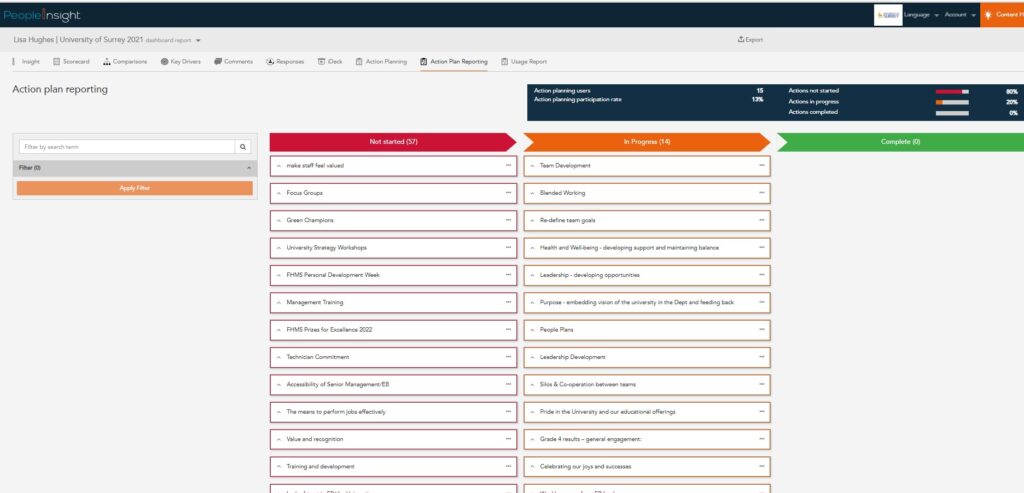
With limited time and resources, the dashboard supports an agile way of working. The tool is the one central resource where team actions are logged, monitored and measured both across the university and at the local level. It also gives the executive board visibility, offering opportunities to celebrate teams for increased engagement and accountability.
